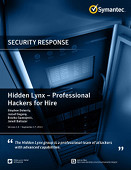This site and others have been writing about the “Advanced Persistent Threat” problem, which has generally been treated as a euphemism for the government and military of The People’s Republic of China or – in some cases – Russia, Iran, North Korea or other un-friendlies. Firms like Mandiant have taken pains to separate the concept of APT from run of the mill cyber criminal hacking groups whose motivation is profit, rather than the acquisition of information that can be used to advance geopolitical or economic goals. Cyber criminal groups may well use “advanced” in their attack methods and “persistent” in their efforts to compromise victim networks, but they weren’t “APT.” Now Symantec Corp. has put a fly into that ointment: publishing a report that pulls the covers off an APT group dubbed “Hidden Lynx” that it claims is responsible for some of the most sophisticated and large scale hacks of […]
Defense Industrial Base
Podcast: Made In China, Secured In The U.S.
We’ve written a lot about the threat posed by nation-state sponsored hackers to U.S. corporations and the economy. So-called “advanced persistent threat” (or APT) style attacks against corporate and government networks have been linked to the theft of sensitive data and intellectual property. Difficult as it is to stop APT attacks against networks, it’s even more challenging to identify threats one-step removed from direct attacks. Lately, attention has shifted to vulnerabilities in the supply chain of companies selling networking gear, servers and other critical IT components. Concerns about corrupted products from foreign suppliers were enough to prompt the U.S. Congress to hold hearings focused on the threat posed to government agencies by Chinese networking equipment makers like Huawei and ZTE. In this week’s podcast, The Security Ledger talks with Jerry Caponera, of Cyberpoint International. Cyberpoint is a Baltimore, Maryland firm that sells Prescient, a service that verifies where true vulnerabilities exist […]
Don’t Call It A Hack Back: Crowdstrike Unveils Falcon Platform
Lots of aspiring technology start-ups dream of getting their product written up in The New York Times or Wall Street Journal when it launches. For Crowdstrike Inc. a two year-old security start-up based in Laguna Niguel, California, media attention from the papers of record hasn’t been an issue. This reporter counted twelve articles mentioning the company in The Times in the last year, and another two reports in The Journal. Much of that ink has been spilled on stories related to Crowdstrike research on sophisticated attacks, or the company’s all-star executive team, including former McAfee executives George Kurtz (CEO) and Dmitri Alperovitch (CTO), as well as former FBI cybersecurity chief Shawn Henry (Crowdstrike’s head of services), who left the Bureau in April, 2012 to join the company. For much of that time, Crowdstrike has been known mostly as a security services and intelligence firm, but the goal was always to […]
Fraud Analytics: You’re Doing It Wrong!
One of the most vexing problems in computer security today is distinguishing malicious from legitimate behavior on victim networks. Sophisticated cyber criminals and nation-backed hacking groups make a point of moving low and slow on compromised end points and networks, while victim organizations are (rightly) wary of disrupting legitimate business activity for the sake of spotting a breach. In this Security Ledger Podcast, Paul interviews Jason Sloderbeck, Director of Product Management at RSA, EMC’s security division. Jason talks about RSA’s Silvertail fraud analytics technology, and the organizational and technology issues that keep victims from spotting attacks. One of the big mistakes organizations make when they investigate attacks, Sloderbeck said, is focusing too narrowly on a point in time during a web session that is felt to be a good indicator of compromise – like when a user authenticates to a service or “checks out” on an e-commerce web site. “There’s a whole […]
Welcoming A New Sponsor: Gemalto
Just a note to my loyal readers that The Security Ledger is welcoming a new sponsor this week: Gemalto. If you’re not familiar with them, Gemalto NV (GTO) is a ~3B firm that makes a wide range of software for e-identity documents, chip payment cards, network authentication devices and wireless modules, as well as the software to manage confidential data and secure transactions in the telecommunications, financial services, e-government, and information technology security markets. This is an especially exciting win for The Security Ledger because Gemalto, with 10,000 employees and offices in 46 countries is a key supplier to the global Internet of Things. Products like its Protiva platform provide the foundation of trust that undergirds online person-to-machine and machine-to-machine transactions and exchanges of all kinds: on mobile devices, smart cards, medical devices, automobiles and more. We’re really excited to have Gemalto on board as a Security Ledger sponsor. Please join […]




